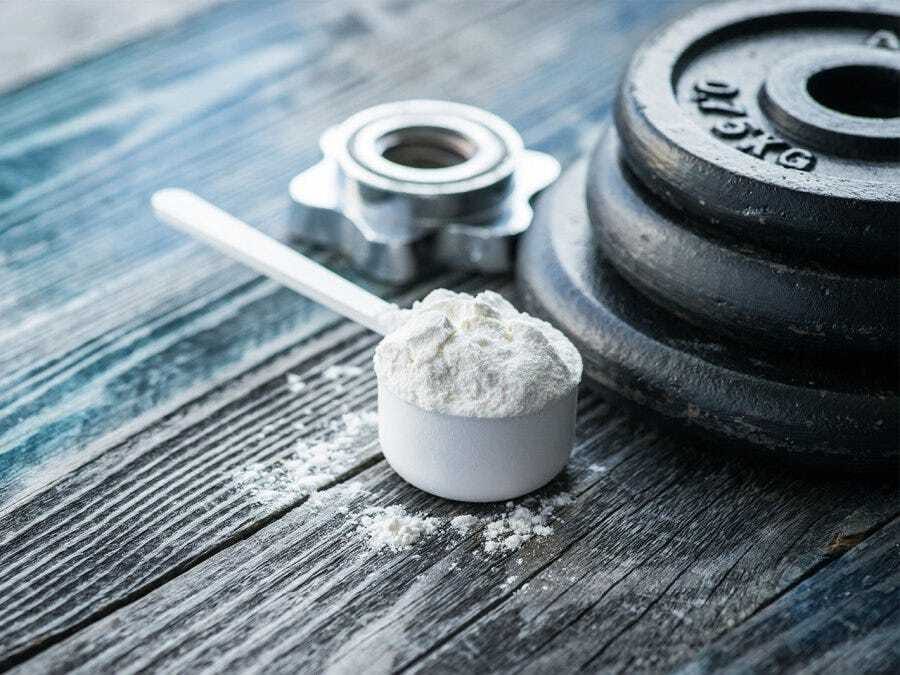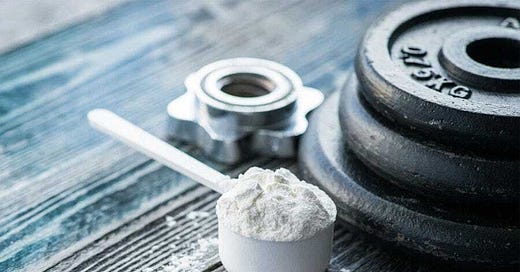Creatine: More Than Just a Workout Supplement
Discover the multiple benefits of this energy-boosting powerhouse

Creatine is a naturally occurring compound found in meat, fish, and some other foods that has gained popularity as a supplement for athletes and fitness enthusiasts. But the benefits of creatine extend far beyond just physical performance.
This versatile compound can help store and release cellular energy, improve pregnancy outcomes, maintain strong bones and muscles, boost brain function, and even help the immune system fight cancer. Here's a closer look at why creatine is a must-have for anyone looking to power up their health. [As always, this is not medical advice, please consult your doctor before starting any supplementation]
What is Creatine and How Does it Work?
Creatine is produced in the liver, pancreas, and kidneys, and stored in the muscles. The amount of creatine stored in the body varies with age, gender, activity level, and diet, but a typical healthy male in his 20s to 30s has about 120 grams stored in his body. Vegetarians have lower levels of creatine, which can be improved with supplementation.
Creatine works by helping maintain steady ATP levels in cells, providing energy for muscle activity. When taken as a supplement, it increases the amount of creatine stored in the muscles. This can lead to improved physical performance as it helps delay muscle fatigue during intense physical activity.
Physical Performance Boost
Creatine supplementation is a popular way to increase the body's stores of this energy-boosting compound. Creatine supplements are typically sold in the form of creatine monohydrate, which is highly soluble and easy to absorb. Studies have shown that taking 5 grams of creatine per day for five to seven days can increase muscle tissue stores of creatine by 20-40%. Maintaining these elevated levels requires continued supplementation of 3-5 grams per day. Some studies suggest that taking creatine hydrochloride, a salt form of creatine, could lead to a 60% increase in oral absorption compared to creatine monohydrate.
Studies have shown that taking creatine supplements can enhance physical performance by increasing fat-free mass, increasing endurance strength, and promoting muscle recovery after exercise. This makes it a popular choice among athletes and fitness enthusiasts looking to take their performance to the next level.
Additional Benefits for Ageing Populations
Creatine supplementation combined with resistance training has been shown to have additional benefits for ageing populations, specifically in improving strength, increasing fat-free mass, increasing muscular endurance, and increasing bone mineral density.
A meta-analysis of multiple studies found that creatine supplementation combined with resistance training was more effective in slowing down age-related muscle decline compared to resistance training alone (https://link.springer.com/article/10.1007/s12020-013-0070-4)
Pregnancy
Research suggests that during pregnancy, creatine is transferred from the mother to the fetus via the placenta and is important for brain development. Studies have shown that higher levels of creatine in newborns are associated with better neural outcomes and lower risk of complications from birth asphyxia. While more research is needed, increased intake of creatine-rich foods may be a good idea for expectant mothers.
Creatine and the Brain
Creatine has been shown to play a role in brain development, function, and ageing. Studies suggest it may help with brain-related disorders such as Huntington's disease and Parkinson's disease, and impairments in creatine metabolism have been linked to depression and anxiety disorders. Research is ongoing to determine how creatine may be used to treat neurological issues.
Cognitive Performance
Some studies suggest that creatine supplementation may enhance cognitive function in young and elderly adults, and vegetarians. However, not all studies show the same results and more research is needed to determine the optimal dose. It is believed that creatine may be most effective when cognitive processes are stressed, such as with sleep deprivation or restrictive diets.
Depression
Depression is thought to be caused by a combination of psychological, physiological, and environmental factors. Some studies suggest that creatine supplementation may help with depression, but results have been mixed. A few trials have shown a reduction in depressive symptoms with creatine supplementation, but others have not found any effect. More research is needed to determine the effectiveness of creatine for depression.
Neurodegenerative Disease
Neurodegenerative diseases cause the loss of structure and function of neurons, leading to problems with memory, speech, and movement. Animal studies have shown that creatine may have neuroprotective effects for diseases such as Huntington's disease, Parkinson's disease, and ALS. There is some evidence that creatine may be more effective as a preventive measure or in combination with other drugs.
Traumatic Brain Injury
Traumatic brain injury (TBI) can lead to cognitive impairment. Some evidence suggests that creatine may have neuroprotective effects for TBI, and one study showed improvements in communication, locomotion, and cognitive function in children and adolescents who took creatine after a TBI. More research is needed to determine the effectiveness of creatine for TBI.
Is It Safe?
Supplementation appears to be safe and well-tolerated by most people and has been shown to improve performance and have potential therapeutic benefits. The main side effect is weight gain, which may be due to increased muscle mass or body water content. There have been reports of adverse events such as musculoskeletal injuries, dehydration, muscle cramping, gastrointestinal issues, and kidney problems, but well-controlled studies have not substantiated these claims.
Some studies suggest that creatine supplementation may alter levels of male steroid hormones, including an increase in dihydrotestosterone (DHT) levels, but these findings have not been consistently replicated and the impact on androgen-related conditions, such as hair loss, is unclear.
[As always, this is not medical advice, please consult your doctor before starting any supplementation]




